It was during the early 1930’s and later in the 90’s that major evictions of the Batwa pygmies were carried out in Bwindi impenetrable forest and Mgahinga National Park. For thousands of years, the Batwa people lived peacefully in the dense forests found in these two national parks and survived by hunting and gathering fruit. Colonial rule by the British marked the beginning of the end for the Batwa reign in the forest. The colonial rulers and later governments of Uganda considered the Batwa to be poachers and saw an urgent need to protect the forests in Bwindi (Then known as Echuya) and Mgahinga – but more importantly the rare and endangered mountain Gorillas living therein.
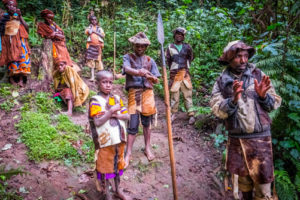 The first of the Batwa were forced to abandon their cultural heritage, customs and way of life to live in selected camps and settlements outside the two forests/parks in the Districts of Kanungu, Kabale and Kisoro. Despite great efforts by the government and several international and local organizations to help ensure a smooth transition to their new settlements, things haven’t gone according to plan. The Batwa have never adapted 100% to their new way of life and settlements. They have to deal with new diseases, drunkenness and chronic poverty which is something they had never experienced considering that the forests provided for their every need.
The first of the Batwa were forced to abandon their cultural heritage, customs and way of life to live in selected camps and settlements outside the two forests/parks in the Districts of Kanungu, Kabale and Kisoro. Despite great efforts by the government and several international and local organizations to help ensure a smooth transition to their new settlements, things haven’t gone according to plan. The Batwa have never adapted 100% to their new way of life and settlements. They have to deal with new diseases, drunkenness and chronic poverty which is something they had never experienced considering that the forests provided for their every need.
While in the forest, they could go hunting, harvest honey or gather fruits. Now they have to practice bee keeping and other farming methods which they find difficult considering the rudimentary methods still used. There are no more free things to get from the forest. They have to toil and plant their own fruit, vegetables, beans and potatoes. Some have resorted to cutting or burning trees for firewood and charcoal. It is common to see Men and women carrying heavy loads of merchandise to the market places for sale.
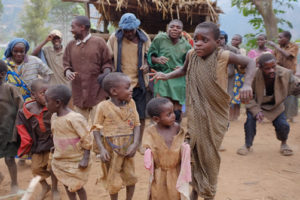 There have been social challenges too. They now have to learn to live with neighboring local Bantu tribes they had avoided for thousands of years. The Batwa face discrimination and stigmatization from their Bantu neighbors because of their different way of life. They have been largely ignored by their neighbors who see their presence as encroachments on their land. Their identity as true citizens of the country is debatable given their relative poverty and general failure to integrate properly. Because of these challenges, some of them still poach animals like antelopes in the park while other live as beggars. Many still dream of getting back to their former comfort zone in the forest.
There have been social challenges too. They now have to learn to live with neighboring local Bantu tribes they had avoided for thousands of years. The Batwa face discrimination and stigmatization from their Bantu neighbors because of their different way of life. They have been largely ignored by their neighbors who see their presence as encroachments on their land. Their identity as true citizens of the country is debatable given their relative poverty and general failure to integrate properly. Because of these challenges, some of them still poach animals like antelopes in the park while other live as beggars. Many still dream of getting back to their former comfort zone in the forest.
Organizations and Agencies supporting the Batwa people
The marginalization, extreme poverty, hunger and particularly high mortality which had reduced the number of the Batwa to about 3,000 people caught the attention of several international and local organizations. 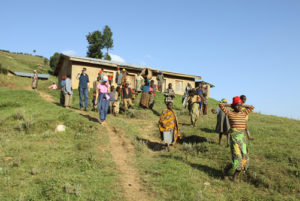 Dr. Scot Kellerman and Carol Kellerman were the first foreign visitors to start projects on water, sanitation and the promotion of the rights of the Batwa people. The Kellerman family settled among the Batwa and founded the Kellerman foundation which works together with the Batwa people and their Batwa Development program to build clinics, hospitals, schools and carry out other community development activities aimed at improving the condition of the Batwa.
Dr. Scot Kellerman and Carol Kellerman were the first foreign visitors to start projects on water, sanitation and the promotion of the rights of the Batwa people. The Kellerman family settled among the Batwa and founded the Kellerman foundation which works together with the Batwa people and their Batwa Development program to build clinics, hospitals, schools and carry out other community development activities aimed at improving the condition of the Batwa.
In 2002, another organization, the United Organization for Batwa Development (UOBDU) was founded to help with supporting activities that help in income generation, land, housing, forest access, benefit sharing, education and adult literacy.
The Batwa Trail in Mgahinga
One of the most innovative initiatives by the organizations supporting the Batwa and the government of Uganda is the The Batwa Trail carried out only in the Mgahinga Gorilla National Park and the Batwa cultural experience in Bwindi Impenetrable Forest National Park. This recent initiative by UOBDU in collaboration with the Uganda Wildlife Authority and the United States Agency for International Development (USAID) aims at empowering the Batwa socially and economically through proceeds from 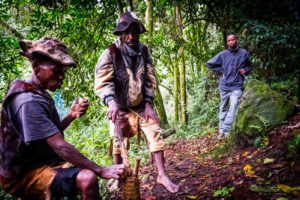 tourists. The Batwa trail offers one of the best Community tours in Uganda. What is the Batwa Trail and cultural experience all about? Well it is an experience designed for tourists/visitors interesting in understanding the way of life and history of the Batwa people during their life in the forest. By the end of the activity, visitors will understand why the Batwa have still failed to adapt to life outside the forest and may not be benefiting from gorilla trekking or other tourism activities. The Batwa trail is carried out in Mgahinga National Park. It is different from the Batwa cultural visit in Bwindi because it is a longer experience which takes place within the park/forests of Mgahinga. The Batwa cultural visit/experience in Bwindi is usually done with Batwa communities living outside Bwindi forest.
tourists. The Batwa trail offers one of the best Community tours in Uganda. What is the Batwa Trail and cultural experience all about? Well it is an experience designed for tourists/visitors interesting in understanding the way of life and history of the Batwa people during their life in the forest. By the end of the activity, visitors will understand why the Batwa have still failed to adapt to life outside the forest and may not be benefiting from gorilla trekking or other tourism activities. The Batwa trail is carried out in Mgahinga National Park. It is different from the Batwa cultural visit in Bwindi because it is a longer experience which takes place within the park/forests of Mgahinga. The Batwa cultural visit/experience in Bwindi is usually done with Batwa communities living outside Bwindi forest.
The 5 hour Batwa Trail is usually led by the Batwa themselves and begins after the guide (a Batwa) kneels down to beg the spirits to keep everyone safe during the journey through the forest. This ancient practice ensured that the hunting sessions where blessed and successful. After the spirit prayer, the Batwa guide leads visitors through the dense forest and around the slopes of the volcanoes like Gahinga and Muhavura.
As you follow the guide, you will realize that to the Batwa, every plant and weed in the forest is has an importance. The guide will often stop to pluck off leaves from trees and demonstrate its medical importance. There are leaves to deal with pressure, fever, diabetes and even the common cold. These remedies are usually first crushed or chewed directly from the mouth. Beside the forest medicines, you will learn how the Batwa prepare their traditional dishes, build their huts, harvest honey and make fire. The Batwa were good artists too and will impress you with some of their products like a cup made out of bamboo. Throughout the trail, the Batwa will narrate stories that will highlight their history/creation and life in the forest. The Batwa experience usually ends with an exploration of the Garamba caves. These dark and quiet ancient caves have a great significance to the Batwa. The Batwa consider the Garamba caves sacred for it used to house the king’s palace and the main food store/granary. During wars with their Bantu neighbors, the Batwa used the caves as meeting and hiding points. After visiting the Garamba caves, you will conclude the activity by being led to witness a traditional dance performance from the Batwa men and women.
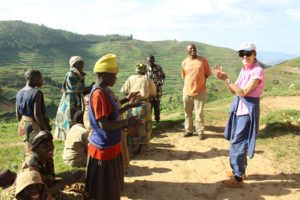 The Batwa trail in Mgahinga and the Batwa cultural visit in Bwindi have contributed greatly to the social and economic welfare of the Batwa community by tapping into the generous proceeds from Tourism. By allowing them back in the forest as Tour guides during the Batwa trail in Mgahinga, they feel like the forest still belongs to them. Moreover, money from the tourists/visitors helps supplement their incomes hence improving the incomes of their families. While visiting the Batwa in Bwindi and Mgahinga, countless tourists have been touched by their plight of the Batwa and offered generous donations which come in form of money, clothing or telling their story internationally. This has further attracted funding to projects geared towards improving the conditions of this unique community.
The Batwa trail in Mgahinga and the Batwa cultural visit in Bwindi have contributed greatly to the social and economic welfare of the Batwa community by tapping into the generous proceeds from Tourism. By allowing them back in the forest as Tour guides during the Batwa trail in Mgahinga, they feel like the forest still belongs to them. Moreover, money from the tourists/visitors helps supplement their incomes hence improving the incomes of their families. While visiting the Batwa in Bwindi and Mgahinga, countless tourists have been touched by their plight of the Batwa and offered generous donations which come in form of money, clothing or telling their story internationally. This has further attracted funding to projects geared towards improving the conditions of this unique community.
Things to consider before going for the Batwa Cultural trail in Mgahinga
Level of Difficulty: The Batwa trail is a relatively less strenuous activity partly because the trails are well maintained and defined. There are a few steep areas particularly around the foot of the volcanoes but this should be manageable for anyone with a reasonable level of fitness. Those with heavy luggage or equipment (camera etc) can hire the services of a local porter at a cost of about $15. Because there are few emergency response health centers and facilities, those with serious medical conditions might think twice before going for the activity.
Cost of the Batwa Trail: The experience in Mgahinga costs $80 for a lone traveler while those traveling in groups pay less. Two international travelers should expect to pay $70 each while a group of 4 or more will part with $60. Those interested in capturing the whole experience on camera or producing a documentary will need to pay an additional $400.
What to wear: While planning to go for the Batwa cultural experience, you also need to take into consideration what to wear. You should travel with a rain jacket, garden gloves, long sleeve shirts and trousers to help protect you from the rains, thorns and sharp forest trees/plants. It’s also wise to carry some snacks/ packed lunch and bottled water. You might also consider bringing along other essential items like a camera and insect repellents. If you have an allergy, you should carry along anti-allergy drugs and any other medications recommended by your doctor.
Note: Unlike gorilla trekking and some of the other activities, you don’t need to carry much for the Batwa trail experience. The Batwa experience is usually arranged after gorilla trekking in Bwindi Impenetrable National Park and Mgahinga Gorilla Park – but the experience can also be undertaken after a wildlife safari or game drive in Queen Elizabeth, Murchison Falls, and Kibale National Parks.
The Batwa Trail and cultural experience is an adventurous activity that is comparable to visiting the Iby’iwacu cultural village in Rwanda. Both help spice up your East African Safari by allowing you take part in and understand the local culture of some of Africa’s indigenous tribes while helping support them economically.

